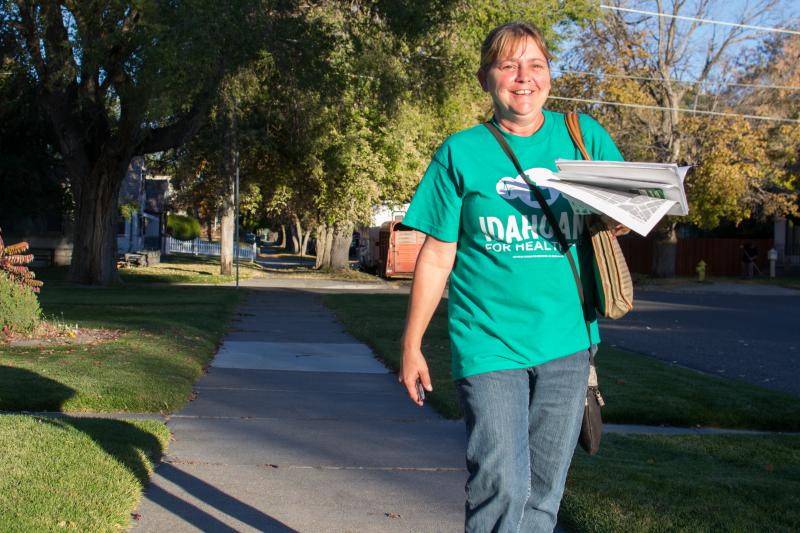
Idaho Legislature Passes Bill Aimed At Making Citizen Initiatives Harder To Get On Ballot
BY KEITH RIDLER / AP
Legislation making it more difficult to get initiatives or referendums on ballots is heading to the governor, who has hinted of a possible veto.
The House voted 51-18 on Wednesday to approve the measure backers said is needed because the current process favors urban voters. It passed the Senate 26-9 last month. Those numbers are enough to overcome a veto.
Opponents said the measure would make it nearly impossible to get initiatives on ballots.
Republican Gov. Brad Little vetoed similar legislation in 2019 out of concern a federal court could find it unconstitutional and dictate Idaho’s ballot initiative process. He has told lawmakers to read his veto message of those bills stating that concern with the current legislation.

File photo. Amy Pratt with advocacy group Reclaim Idaho personally collected more than 1,000 signatures to help get Medicaid expansion Proposition 2 on Idaho’s 2018 ballot.
CREDIT: James Dawson / Boise State Public Radio
Current rules require signatures from 6% of registered voters in each of 18 legislative districts in 18 months. The proposed law would require 6% of registered voters in all 35 Idaho districts in 18 months.
Backers argued that getting signatures from every district should be required to make sure initiatives have widespread support. Currently, they say, signature gatherers can focus on four highly populated counties to get all the signatures they need.
“Every district in Idaho should be represented in that process,” Republican Rep. Sage Dixon said. “This is an effort to protect the voice of everybody in Idaho in the lawmaking process, very similar to what we do here as representatives, and what the senators do as well.”
Idaho residents in 1912 adopted two constitutional amendments approving the initiative and referendum process. But they told lawmakers to figure out the details. Opponents of the current legislation said that doesn’t mean lawmakers are allowed to make the initiative and referendum process impossible.
“There is absolutely no reason why we should put this incredibly stifling restriction when it’s the people trying to pass a bill,” Democratic House Minority Leader Ilana Rubel said. “It will not be practically possible to get citizen-driven ballot initiatives on the ballot if this law goes into effect.”
Five former Idaho attorney generals in a letter to House lawmakers earlier this week advised against passing the bill, saying doing so “will likely be just the first chapter in a divisive fight.”
Lawsuits are almost certain in both federal and state court, the former attorney generals wrote, if the bill becomes law.
While the Idaho Constitution “gives the Legislature the authority to set the procedural rules for conducting an initiative or referendum, there is no basis for making those rules so strict that these measures of people power are nullified.”
Voter-driven ballot initiatives, which act as a check on the Legislature, have become a major focus in the state in recent years. After years of inaction by Republican lawmakers, 62% of Idaho voters approved an initiative expanding Medicaid in 2018.
That’s been the only successful ballot initiative since the current rules were put in place in 2013. Lawmakers toughened the process that year after voters by referendum overturned laws involving education reform.
In response to Medicaid expansion, Republicans in the House and Senate in 2019 tried to make the initiative process nearly impossible so they could head off future measures such as raising the minimum wage and legalizing marijuana.
The first of the 2019 measures would have required signatures from 10% of registered voters in 32 of 35 districts over six months. It also would have required that people asked to sign initiative petitions be shown notes on fiscal impact and possible funding sources.
Another bill called for signatures from 24 of Idaho’s 35 legislative districts over nine months. It also would have required the signatures of 10% of registered voters and specifying the funding source.
The Republican-dominated House and Senate passed both bills. But Little vetoed them, fearing a federal court ruling and order setting the state’s initiative process.
Copyright 2021 Associated Press















